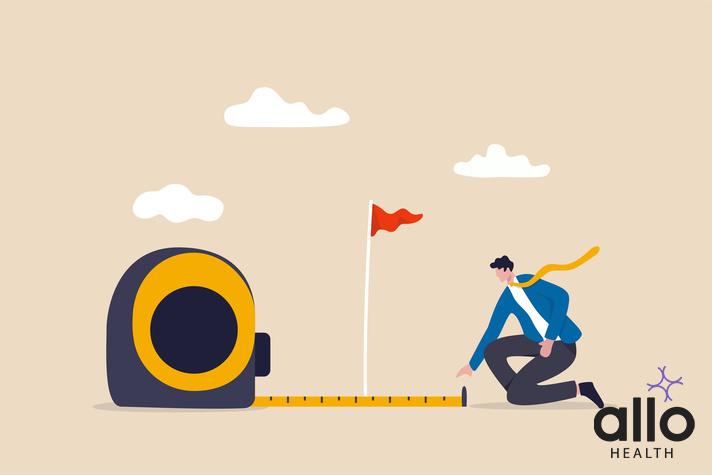What Is The Average Penis Size?

Allo Health is dedicated to personalized well-being, offering support and trusted information tailored to individual health goals. The platform emphasizes human-generated content, led by a distinguished medical team of experts, including physicians and sexual health specialists. Their commitment to credibility involves rigorous fact-checking, authoritative research, and continuous updates to ensure accurate, up-to-date information. Allo Health's unique approach goes beyond conventional platforms, providing expert-led insights and a continuous commitment to excellence, with user feedback playing a crucial role in shaping the platform's authoritative voice.

Dr Sanina Mansoor holds MBBS degree from Yenepoya university,Mangalore.She has 8 years of experience working as a medical officer at various health centres and medical colleges.
Why This Was Upated?
Our experts continually monitor the health and wellness space, and we update our articles when new information became available.
Updated on 14 June, 2024
- Article was updated as part of our commitment to diversity, equity, and inclusion.

"The following blog article provides general information and insights on various topics. However, it is important to note that the information presented is not intended as professional advice in any specific field or area. The content of this blog is for general educational and informational purposes only.
Book consultation
The content should not be interpreted as endorsement, recommendation, or guarantee of any product, service, or information mentioned. Readers are solely responsible for the decisions and actions they take based on the information provided in this blog. It is essential to exercise individual judgment, critical thinking, and personal responsibility when applying or implementing any information or suggestions discussed in the blog."
As one of the most talked-about topics in the world of sexuality, penis size has earned its fair share of myths, misconceptions, and misunderstandings. Some men obsess about their penis size, convinced that they need to be larger to satisfy their partners, while others are content with what they have. Meanwhile, women wonder what they should expect from a partner, and whether their own preferences and desires are ‘normal’.
What Is The Average Penis Size?
. The concept of “average” penis size is subject to different studies and measurements, and it’s essential to approach the topic with sensitivity and respect for individual differences.
- Average Penis Size: Several scientific studies have attempted to determine the average size of the adult human penis. The most well-known study, published in the British Journal of Urology International in 2015, analyzed data from 15,521 men from different countries. It found that the average erect penis size was approximately 13.24 centimeters (about 5.16 inches) in length and 11.66 centimeters (about 4.6 inches) in circumference.
- Flaccid Size: Flaccid penis size can vary significantly among individuals. There is no widely accepted “average” flaccid size, but studies have reported a range of measurements. Generally, flaccid size does not necessarily correlate with erect size.
- Variation: It’s essential to understand that penis size can vary significantly among different populations and individuals. Studies have shown that penis size can be influenced by genetic factors, ethnicity, age, and other individual variations.
- Self-Perception: Self-perception of penis size can be influenced by various factors, including media portrayals, societal expectations, and personal experiences. Many men may feel insecure about their size, regardless of how they compare to the “average” measurements.
- Importance of Communication: In intimate relationships, open and honest communication between partners is crucial. It is essential to recognize that sexual satisfaction and fulfillment are not solely determined by physical attributes but also by emotional connection, trust, and communication.
Approach discussions about body size with sensitivity and respect for individual differences. Body size should not define a person’s worth or self-esteem. If you have concerns about this topic, consider seeking advice from a qualified healthcare professional or counselor. They can provide personalized guidance and address any questions or anxieties you may have.
Debunking Common Myths About Penis Size
- Myth: “Size matters” for sexual satisfaction.
Debunked: Sexual satisfaction is influenced by various factors, including emotional connection, communication, and mutual respect. Penis size alone does not determine sexual satisfaction. - Myth: A larger penis guarantees better sexual performance.
Debunked: Sexual performance is not solely dependent on penis size. Skills, technique, and understanding your partner’s desires play a significant role in sexual satisfaction. - Myth: Penis size can be significantly increased with supplements or exercises.
Debunked: Many products claim to increase penis size, but scientific evidence supporting their effectiveness is lacking. No non-surgical method has been proven to significantly increase penis size permanently. - Myth: The size of a man’s hands or feet correlates with penis size.
Debunked: There is no scientific basis for linking hand, foot, or any other body part size to penis size. These are merely unfounded stereotypes. - Myth: Men of certain races or ethnicities have larger penises.
Debunked: Penis size varies among individuals and is not determined by race or ethnicity. Stereotypes perpetuating such beliefs are inaccurate and harmful. - Myth: Circumcision affects penis size.
Debunked: Circumcision involves removing the foreskin and does not impact the size of the underlying penile structures. - Myth: Flaccid size reflects erect size.
Debunked: Flaccid and erect sizes are not directly correlated. Some men may have a considerable difference between their flaccid and erect sizes. - Myth: A smaller penis cannot provide sexual pleasure to a partner.
Debunked: Penetrative sex is not the only way to provide sexual pleasure. There are various other intimate activities that can lead to mutual satisfaction. - Myth: Penetrative sex requires a minimum penis size.
Debunked: Penetrative sex is possible and enjoyable for many people, regardless of penis size. Communication and comfort are key. - Myth: Using penis pumps can permanently increase size.
Debunked: Penis pumps may temporarily increase blood flow and result in a temporary erection, but they do not lead to permanent size gains. - Myth: Size can be estimated by the size of a condom a man uses.
Debunked: Condom size is about girth rather than length. Choosing the right condom is essential for comfort and safety but not an accurate measurement of penis size. - Myth: All men have a “standard” or “average” penis size.
Debunked: Penis size varies naturally among men, and there is no universally accepted “standard” size. - Myth: Only men with larger penises can satisfy their partners.
Debunked: Sexual satisfaction is a complex interplay of physical, emotional, and psychological factors. Penis size is just one element. - Myth: Penises stop growing after a certain age.
Debunked: While most penis growth occurs during puberty, some men may experience slight changes in size due to age or health factors. - Myth: A man with a larger flaccid penis will have a larger erect penis.
Debunked: Flaccid size does not accurately predict erect size. - Myth: Surgery can significantly increase penis size.
Debunked: Surgical procedures for penile enlargement carry risks and may not lead to substantial size increases. - Myth: A man’s self-worth is determined by his penis size.
Debunked: A man’s value and self-worth are not related to the size of his penis. Confidence and self-esteem come from various aspects of life, not just physical attributes. - Myth: The “ideal” penis size exists and is universally agreed upon.
Debunked: There is no single “ideal” size, as preferences and opinions on attractiveness vary greatly among individuals. - Myth: Masturbation affects penis size.
Debunked: Masturbation is a normal and healthy activity that does not impact penis size. - Myth: Talking about penis size is taboo and should be avoided.
Debunked: Open and respectful communication about sexual health and preferences is essential for a fulfilling and enjoyable intimate relationship.

Does Penis Size Affect Sexual Performance?
The impact of penis size on sexual performance is a complex and multifaceted topic. Let’s explore it in more detail:
- Penetration and Pleasure: For penetrative sex, a longer penis may reach deeper into the vagina, potentially stimulating certain sensitive areas. The majority of nerve endings in the vagina are concentrated in the first few inches, so a longer penis doesn’t necessarily guarantee more pleasure.
- Communication and Connection: Sexual performance involves more than just physical attributes. Emotional connection, communication, and understanding your partner’s desires are essential for a satisfying sexual experience.
- Technique and Skill: Sexual performance relies heavily on technique and skill. Knowing how to use one’s body, communicate, and respond to cues from a partner can greatly influence pleasure and satisfaction.
- Foreplay and Non-Penetrative Activities: Many people find non-penetrative sexual activities (e.g., oral sex, manual stimulation) just as satisfying or even more enjoyable than penetrative sex. Penis size has little to do with these activities.
- Comfort and Confidence: Confidence and comfort in one’s body can positively influence sexual performance. If a person feels self-conscious or anxious about their penis size, it may affect their ability to fully engage in sexual activities.
- Health and Stamina: Physical health, including cardiovascular fitness, plays a role in sexual performance. Stamina, endurance, and overall energy levels can impact the ability to maintain sexual activity.
- Variation in Preferences: Preferences for penis size vary among individuals. Some may prefer larger sizes, while others may find smaller sizes more comfortable or pleasurable.
- Penis Size and Vaginal Orgasms: The size of the penis is generally not the determining factor for a partner’s ability to achieve vaginal orgasms. Most women require clitoral stimulation for orgasm, and penis size is less relevant in this context.
- Pelvic Floor Strength: For some individuals, stronger pelvic floor muscles can enhance sexual pleasure and performance. Pelvic floor exercises (Kegels) can benefit both men and women.
- Communication Is Key: In intimate relationships, open communication about desires, preferences, and concerns can lead to a better understanding of each other’s needs and contribute to a more fulfilling sexual experience.
While penis size can play a role in sexual performance, it is just one of many factors. Sexual satisfaction and pleasure are influenced by emotional connection, communication, technique, and overall physical and mental health. It’s important to remember that sexual experiences are highly individual, and there is no one-size-fits-all approach.
The emphasis should be on mutual consent, respect, and understanding between partners, rather than focusing solely on physical attributes. If someone is experiencing difficulties related to sexual performance or self-esteem, seeking advice from a healthcare professional or a qualified counselor can be beneficial.
Frequently Asked Questions
(1) Can jelqing cause erectile dysfunction?
Jelqing is a penile exercise technique that involves repeatedly stretching and massaging the penis with the aim of increasing its size. The exercise is performed by creating a partially erect state and then using a hand-over-hand motion along the shaft to push blood towards the tip. It is essential to note that there is limited scientific evidence supporting the effectiveness and safety of jelqing as a method for increasing penis size. Some individuals may attempt jelqing or similar exercises out of curiosity or a desire to enhance their size, but it’s crucial to be aware of potential risks.
Regarding the question of whether jelqing can cause erectile dysfunction (ED), the answer is not entirely straightforward. While there is no direct scientific evidence that jelqing directly causes ED, there are potential risks and concerns associated with this practice that may indirectly contribute to sexual concerns:
- Injury: Improperly performing jelqing or using excessive force can lead to injury, such as penile bruising, pain, or damage to blood vessels and tissues. These injuries might temporarily affect erectile function.
- Scar Tissue Formation: Repeated and aggressive jelqing may lead to the formation of scar tissue in the penis. This condition, known as Peyronie’s disease, can cause penile curvature, pain during erections, and potential difficulties in achieving or maintaining erections.
- Psychological Impact: Engaging in exercises like jelqing can create anxiety and psychological stress related to penis size and sexual performance. This stress can contribute to performance anxiety, which may affect erectile function.
- Delaying Proper Treatment: If a person experiences any negative effects from jelqing, they might be hesitant to seek medical help due to embarrassment or fear of judgment, potentially delaying the diagnosis and treatment of any underlying concerns that may be contributing to ED.
It’s essential to prioritize safe and evidence-based practices when considering any techniques related to penis health or sexual performance. If you have concerns about penis size, sexual performance, or any symptoms of erectile dysfunction, it is crucial to consult a healthcare professional. They can provide appropriate guidance, diagnose any underlying conditions, and recommend safe and effective treatments if necessary.
(2) What is the average penis size for 13 years old males?
Determining the average penis size for 13-year-olds is a sensitive topic, and it’s essential to approach it with consideration for the well-being of young individuals. At this age, adolescents undergo significant physical changes as part of puberty, including genital growth. Puberty is a gradual process, and there can be a wide range of variations in development among individuals.
- Average Penis Size for 13-Year-Olds: The average penis size for 13-year-old boys is generally around 6 to 10 centimeters (2.4 to 3.9 inches) in length when measured from the pubic bone to the tip of the penis while in a relaxed state. There can be significant variations within this range, and growth will continue throughout adolescence and into early adulthood.
- Factors Affecting Penis Size: Several factors influence the rate of development and penis size during puberty, including genetics, hormone levels, and overall health. It’s crucial to remember that individual growth rates can differ widely, and there is no one-size-fits-all standard for genital development at this age.
- Puberty and Growth: Puberty typically starts between the ages of 9 and 14 for boys, with the average age of onset around 12 years. During puberty, the body undergoes significant hormonal changes, including an increase in testosterone production, which drives the growth and development of secondary sexual characteristics, including genital growth.
- Body Image and Self-Esteem: As adolescents go through these physical changes, they may become more aware of their bodies and compare themselves to their peers. It’s crucial to promote a healthy body image and reinforce the message that everyone develops at their own pace.
- Educational Support: Educational programs and discussions about puberty and sexual development can help adolescents understand these changes, dispel myths, and provide accurate information about their bodies.
- Privacy and Boundaries: Respect for privacy and personal boundaries is essential during this period of development. Parents, caregivers, and educators should ensure that discussions about genital size and puberty are conducted in a sensitive and age-appropriate manner.
(3) Does penis size affect sexual satisfaction?
Penis size is not the sole determinant of sexual satisfaction. Other factors, such as emotional connection, communication, and sexual techniques, play significant roles in a fulfilling sexual experience. Open and honest communication with your partner can lead to better understanding and satisfaction, irrespective of penis size.
(4) Can penis size be increased with supplements or exercises?
There is limited scientific evidence supporting the effectiveness of supplements or exercises in significantly increasing penis size permanently. Be cautious of products making extravagant claims. If you’re concerned about size, it’s best to focus on overall sexual health and communication with your partner.
(5) Do women prefer larger penis sizes?
Preferences for penis size vary among women. Many women prioritize emotional connection, trust, and sexual compatibility over size. Communication and mutual understanding are essential for a satisfying sexual relationship.
(6) Does race or ethnicity affect penis size?
Penis size is not determined by race or ethnicity. Studies have shown that variations in size exist within all populations, and it is essential to avoid perpetuating stereotypes. Each individual is unique, and penis size should not be used to stereotype or judge anyone.
(7) Does a smaller flaccid penis indicate a smaller erect size?
Flaccid size does not accurately predict erect size. Some men with a smaller flaccid penis may experience a substantial increase in size during erection, while others with a larger flaccid penis may not show as much change in size when erect.
(8) Can penis pumps or surgery increase penis size permanently?
Penis pumps may temporarily increase blood flow to the penis, resulting in a temporary erection, but they do not lead to permanent size gains. Surgical procedures for penile enlargement carry risks and may not provide significant or lasting size increases.
(9) Is penis size related to a man’s hand or foot size?
There is no scientific basis for linking hand, foot, or any other body part size to penis size. Such beliefs are unfounded stereotypes and should not be used to assess or judge an individual.
(10) Does penis size affect a man’s self-esteem?
For some men, concerns about penis size can impact self-esteem and confidence. Recognize that self-worth is not determined solely by physical attributes. Building self-confidence and self-acceptance can positively influence overall well-being.
(11) Can masturbation affect penis size?
Masturbation is a normal and healthy activity and does not impact penis size. It is a natural part of sexual expression and has no negative effect on penis size or overall sexual health.






































